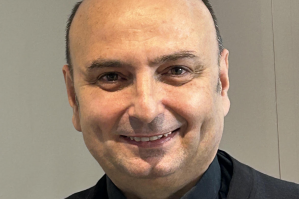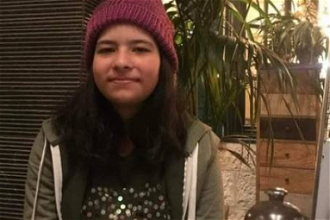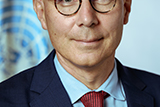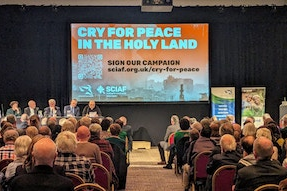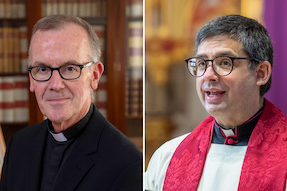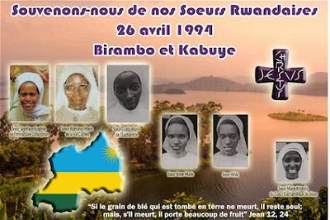London: Pat Gaffney at Alternative Remembrance Gathering
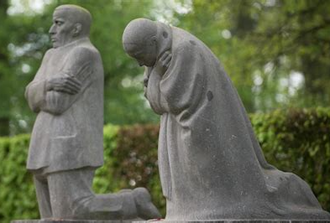
Grieving Parents by Kathe Kollwitz
Pat Gaffney gave this talk at Alternative Remembrance Gathering yesterday in Tavistock Square, central London. Organised by the Peace Pledge Union, the otherspeakers were Richare Kuper, Jews for Justice for Palestinians and Isabel Kelly, representing the Parents Circle - Families Forum. Around 150 people of all ages and backgrounds attended.
I took this photograph, on a day rather like this, in 2014 at the Germany cemetery in Vladslo Flanders. It is of the 'Grieving Parents' created by the German sculptress, Kathe Kollwitz. Her son Peter had been killed in 1914. The mother bent double as if winded by the news of her son's death. The father hugs himself as though in pain with the grief. An image with universal meaning.
I doubt the parents and grandparents in Gaza, the West Bank and Israel have time to mourn and grieve. I think of the words used this week by Antonio Guterres, Gaza has become a graveyard of children.
For me, remembrance of war calls me to the work of peacemaking. In my years of work with Pax Christi, the International Catholic Movement for Peace, itself born out of the experience of World War II, I have learnt that we don't simply say "No more war." We say 'yes' to nonviolent peacemaking. We bring to the table a much larger tool-box of approaches and experiences of thousands of people around the world working to prevent injustice and violence, to dismantle the tools of war, to offer civilian approaches to protection, to educate and skill people in mediation and conflict transformation, to train people in resistance and non-cooperation - to create a just-peace rather than a just-war response to injustice and violence
In 1999 Pax Christi elected the then Patriarch of Jerusalem, Michel Sabbah, a Palestinian, as our International President. He urged us to engage more deeply in the divisions and conflicts of his land of three peoples, Jews, Christians and Muslims and seek ways of building peace.
Since then I have made seven visits to the region, alone or taking delegations, to build partnerships with Palestinian and Israeli peace and community groups. These include Wi'am Centre for Conflict Transformation, Women in Black, the Arab Educational Institute, New Profile, Rabbis for Human Rights, the Arab Israeli village of Neve Shalom - Wahat al Salaam, the Aida Refugee Camp, Bethlehem University. They have helped teach us about the geography of occupation, the 'facts on the ground' of the separation wall, the by-pass roads, illegal settlements, the house demolitions and more, all sustained through the heavy military might of the Israeli government.
Today, communities in the West Bank feel they are experiencing a new/ ongoing NAKBA, a new stranglehold on their lives created by the war in Gaza. As one journalist reported: "Settlers are exploiting the fact that all eyes are on Gaza to take over more and more Palestinian land".
As the daily death toll in the West Bank rises, of young men in particular, a partner in Bethlehem sent this message: "Thousands of Gazans stay 'illegally' in the West Bank, (according to Israel's definition of legality.) The town of Huwara, south of Nablus, has become a ghost town due to the reign of terror inflicted by settlers, passively shielded or actively supported by the army.
"In recent weeks, 13 small Bedouin communities to the east of Ramallah and south of Hebron, with hundreds of people, have been evicted from their homes and lands. Settlers are currently recruited by the army to guard the settlements. Increasingly, settlers and the army are becoming indistinguishable."
At the same time the economy suffers. Trade is stopped or limited. Tourism, a key source of income for towns like Bethlehem, Hebron, Ramallah, has ended. The olive harvest, a cultural and economic feature of Palestinian life, often supported by internationals, is this year under threat as never before. My friend Usama posted a message on FB: we are looking for some good news, even if it is just a rumour.
For me, the good news is the hope offered by peacemakers who remain steadfast - living SUMUD, that wonderful word that implies standing firm, not moving. They refuse to hate and hold on to the belief that the unglamorous, painstaking work for peace must go on and will be needed when this horrific time of violence comes to an end. The partnerships we have created help us learn how best to support people and sharpen our focus for advocacy. Pax Christi International has an advocacy presence UN Working Group in New York and the Council of Europe in Strasbourg; both provide opportunities for voices from Palestine to relate their experiences of injustice and violence.
In Bethlehem our sister organisation the Arab Education Institute has for years offered workshops in West Bank schools on Diversity and Citizenship within the Christian Muslim context, they see cooperation between the two an essential part of peacemaking. They have created a Wall Museum - gathering stories and memories of people in Bethlehem that capture experiences of life before and after the Nakba and the building of the separation wall. These are mounted on the wall - allowing the people of that town to tell their own story to tourists and others. We have been able to use these and other materials they produce, as awareness raising tools here in England.
Pax Christi women visiting Palestine and Israel have joined with Women in Black in Jerusalem to be in solidarity with their weekly protests against the occupation. These women often experience terrible abuse from passers-by, being called traitors and worse. Started by Israeli women, the movement is now global. It has been encouraging in recent weeks to see new Women in Black groups forming and more women join long-established groups in England and Scotland, to stand for justice and nonviolent resolutions of the war in Gaza and Israel.
Another international partner is the Ecumenical Accompaniment Programme in Palestine and Israel. Members of Pax Christi have gone to Palestine as volunteers living and working in Bethlehem, Hebron, Nablus, Yanoun. There, they monitor human rights abuse, accompany children to school and offer an international protection presence against settler violence. These lived experiences become powerful tools for political advocacy - an integral part of this initiative. Sadly, at this time, many volunteers have been pulled out of the region until things become more secure again.
Some years ago Pax Christi here coordinated an international education and advocacy campaign: The people of the Holy Land need Bridges not Walls. Its purpose was to bring home to faith based groups the impact of the separation wall on daily life and to question its security value to Israel. Pax Christi members campaign against UK arms sales to Israel; take part in boycotts of settlement goods; lobby members of Parliament and most recently, organise church and community actions for prayer and political action, calling for a ceasefire. We believe it is important for Christians to put their faith into action and to work with others to bring nonviolent solutions, experiences and ethical teachings to issues of war and violence. We are encouraged by the present Patriarch of Jerusalem, Cardinal Pizzabella, who offered himself in place of Israeli children held hostage by Hamas and who weekly calls out the unjustifiable attacks on civilians.
I would like to finish with another piece of good news and solidarity. Last week Pax Christi International announced that The Parents Circle - Families Forum, a collaborative Israeli Palestinian initiative (represented here today) is the recipient of the 2023 Pax Christi International Peace Award. The award ceremony will be held in the Holy Land, as soon as the conditions allow, meanwhile, a virtual webinar will be held on December 10th, 2023, on Human Rights Day, to present the organisation and share why it has been chosen them as the recipient of this year's award. A small gesture, yes. A small sign of hope, yes. And recognition of the spirit and wisdom of peacemakers who no longer want to see and hear parents grieving for the children they have lost to violence and war.
Pat Gaffney is vice president of Pax Christi. Pat was the coordinator of Pax Christi between 1990 - 2019.



